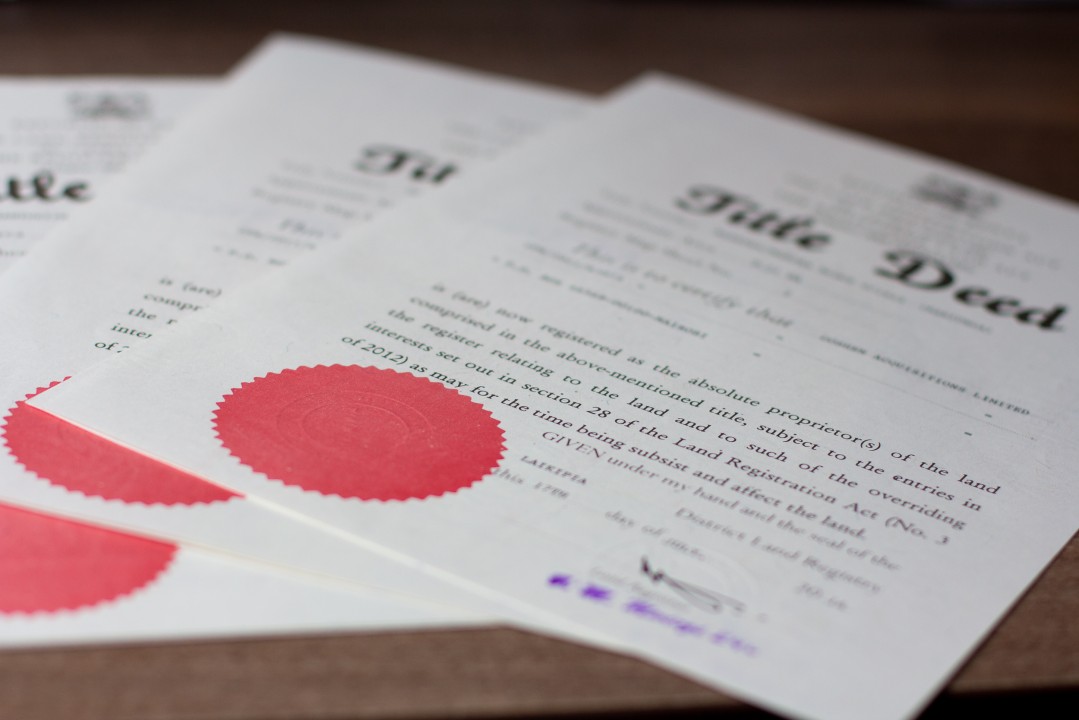Title Deeds in Thailand
Understanding title deeds in Thailand is essential for anyone engaging in property acquisition, land development, leasing, or investment. Thailand’s land administration system is unique and highly structured, governed primarily by the Land Code of Thailand and administered by the Department of Lands. However, not all land documents are equal—the strength of one’s land rights depends entirely on the type of title deed held.
This article provides a detailed breakdown of the types of title deeds in Thailand, their legal status, limitations, rights conveyed, implications for foreign ownership, and practical considerations for due diligence.
1. Classification of Land Title Deeds in Thailand
There are several types of documents that can be referred to as “title deeds” in Thailand, but they fall into a legal hierarchy from full ownership rights to mere possessory claims. The most significant title types are:
-
Chanote (Nor Sor 4 Jor)
-
Nor Sor 3 Gor (NS3K)
-
Nor Sor 3 (NS3)
-
Sor Kor 1 (SK1)
-
S.P.K. 4-01 (Agricultural Land Use Certificate)
Each of these serves different legal purposes and confers varying degrees of land rights.
2. Chanote (Nor Sor 4 Jor) – Full Ownership Title
Legal Nature:
-
This is the highest form of land title under Thai law.
-
Issued only after a precise cadastral survey with GPS coordinates.
-
The boundaries are clearly demarcated on the ground and officially mapped.
Rights Conferred:
-
Full ownership
-
Right to sell, lease, mortgage, gift, or subdivide the land
-
Right to build, subject to zoning and environmental laws
-
Use in legal proceedings as indisputable evidence of ownership
Special Notes:
-
Mostly available in urban and suburban areas.
-
Preferred title for foreign leaseholds and large-scale development.
3. Nor Sor 3 Gor (NS3K) – Confirmed Usage Title
Legal Nature:
-
Recognized as a certificate of utilization, but not yet full ownership.
-
The land is officially surveyed, and coordinates are mapped.
Rights Conferred:
-
Can be transferred, leased, or mortgaged
-
Eligible to be upgraded to Chanote, subject to land office approval
Limitations:
-
Slightly weaker than Chanote in legal clarity, especially for high-value projects.
4. Nor Sor 3 (NS3) – Usage Title Without Fixed Boundaries
Legal Nature:
-
A certificate acknowledging the right to occupy and use the land.
-
Boundaries are approximate, based on neighboring plots, not precise survey.
Rights Conferred:
-
Can be sold, transferred, or leased, but with more procedural steps (including posting of public notice)
-
Can potentially be upgraded to NS3K or Chanote
Risks and Limitations:
-
Higher chance of boundary disputes
-
Caution required for investors and foreigners due to ambiguity
5. Sor Kor 1 (SK1) – Possessory Right Document
Legal Nature:
-
Merely a notification of possession, not a title.
-
Confirms long-standing occupation but not ownership.
Use Cases:
-
May be used to apply for higher title (e.g., NS3), after proving possession and use.
Limitations:
-
Cannot be transferred, leased, or used for mortgage
-
Offers no legal protection in disputes
6. S.P.K. 4-01 – Agricultural Reform Land
Legal Nature:
-
Issued under the Agricultural Land Reform Act
-
Meant for landless farmers and strictly for agricultural purposes
Restrictions:
-
Cannot be sold, leased, or mortgaged
-
Must be used only by the allotted farmer
7. Important Land-Related Documents (Non-Deeds)
While not title deeds themselves, other land-related documents sometimes confuse investors:
-
Preemption Certificates (Nor Sor 2) – Temporary land use rights for later title applications.
-
State Land Documents – For land within forest reserves, national parks, or royal property, which are non-transferable and not privately owned.
8. Title Registration, Transfer, and Due Diligence
Title Search:
-
Conducted at the Provincial Land Office.
-
Reveals:
-
Owner’s name
-
Type of title
-
Encumbrances (mortgages, leases, servitudes)
-
Land area and zoning data
-
Transfer Process:
-
Agreement between buyer and seller
-
Preparation of documents (title deed, ID cards, company registration if applicable)
-
Payment of taxes and fees:
-
Transfer fee (2%)
-
Stamp duty (0.5%) or specific business tax (3.3%)
-
Withholding tax
-
-
Official registration at the Land Office
Land Measurement and Survey:
-
NS3K and Chanote titles should be cross-verified with physical surveys.
-
Many title disputes in Thailand arise from overlapping or misrepresented boundaries.
9. Foreign Ownership and Title Deeds
Direct Ownership:
-
Foreigners cannot own land directly, except under rare circumstances (e.g., BOI incentives).
Alternative Legal Structures:
-
30-year leasehold with possible renewal
-
Usufruct rights, superficies, or habitation
-
Ownership of condominiums, where foreign quota does not exceed 49% of the total area
Key advice: Only Chanote or NS3K titles should be accepted for foreign lease or development. NS3 or SK1 titles expose the lessee to legal uncertainty.
10. Risk Assessment and Legal Red Flags
-
Nominee structures: Using Thai nationals to hold land on behalf of a foreigner is illegal and can be challenged.
-
Fraudulent land sales: Always verify titles and compare with GPS surveys.
-
Encroachment issues: Title deeds sometimes overlap with protected forests or public land.
-
Ongoing disputes: Check the civil and criminal court databases or consult local legal professionals.
11. Upgrading Land Titles
Owners of NS3 and NS3K land may apply for title upgrades through the Land Office. Requirements include:
-
Proving legal use and occupation
-
Absence of disputes
-
Location within surveyed zones
-
Adherence to zoning and land-use laws
The process is bureaucratic and can take several months but significantly increases land value and legal security.
Conclusion
Thailand’s title deed system is nuanced and layered, with implications that can significantly affect ownership rights, investment security, and project feasibility. While Chanote remains the gold standard of ownership, understanding how other titles function—along with their limitations—is critical, particularly for foreigners or investors. Due diligence is not optional but essential, as the consequences of misidentifying or misunderstanding a title can be severe, both legally and financially.











